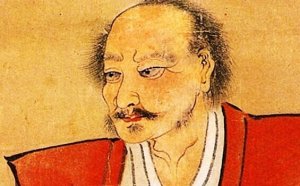The 10 Rules of Life, According to a Japanese Buddhist Teacher

Miyamoto Mushashi was a famous samurai warrior in the feudal era of Japan. He was the author of the famous The Book of Five Rings. He is also well-known for writing a list with the rules of life two weeks before he died.
As a good Eastern warrior, for Miyamoto the fight was much more than a fight. The samurai gave enormous value to personal growth. This was precisely the means to becoming a good fighter. The rules of Miyamoto’s life have survived the test of time, like a true classic. They reflect the wisdom of those who have lived with courage and devoted to noble causes. We’ve synthesized these precepts into ten rules, which we will now share with you.
1. The rules of life: acceptance
#1 in Miyamoto’s rules of life is to accept life just as it is. Acceptance does not mean resignation, but humility. Life is what it is, and each of us must have an attitude of learning from circumstances that we didn’t choose but have to live with anyway.
The consequence of not accepting reality is permanent suffering. This leads to an inner battle that we will always lose. Acceptance, on the other hand, means we will learn from each situation.
2. Think little about yourself, and a lot about others
A person who thinks too much about themselves ends up getting confused. They wall themselves off from the world and feed their insecurities. Instead of thinking about yourself, it’s ok to let yourself just be.
True happiness is in serving others. There is nothing that compares to the satisfaction of doing good. A person who is generous shows themselves to be powerful too. In the end, this is what allows them to appreciate themselves.

3. Learn to let go of desire
Desire, understood as a longing for what one does not have, only brings eternal dissatisfaction. Having things is like a bottomless barrel. The more you have, the more you want. And each time it’s harder to be satisfied.
Miyamoto, like many Eastern thinkers, fought to eradicate desire. A person who longs is frustrated. Real power is in the ability to go without, to give up. A person who needs little, with little is happy.
4. Don’t make room for guilt
Guilt is the root of much suffering. The worst thing of all is that it is useless. This is what Miyamoto says in his rules of life. He insists that we should not see error as a condemnation, but rather as our nature.
Every action we do teaches us something. It also changes us in some way. If a person did something wrong, he taught us a lesson. That’s why we shouldn’t dismiss anything we go through. The important thing is to learn from it and become wiser.
5. No more complaints or resentment
Complaints only open the door to bad energy and torment people around you. It doesn’t make any sense because instead of moving you to action, it ends up paralyzing you. According to Miyamoto’s rules of life, complaints and resentment poison a person from the inside out. They are useless. Instead, they kill any positive feelings that might be in there too.

6. Let go of things you do not need
Objects influence our emotions and our way of seeing life. If we get too attached to them, they end up controlling us. They make our conscience less free. This applies especially to things that we no longer need but keep anyway. In the end, they make us more insecure, rigid people. That’s why the rules of life teach us to get rid of useless things.
7. Do not blindly follow the beliefs of others
This piece of wisdom is about trusting yourself. Trust in your own common sense. Respect your own convictions and your own values. Otherwise, you’ll be easy to manipulate. Nobody needs to be told what is good or what is bad. We all have the ability to decide this for ourselves. Following blindly means you’ll inevitably betray yourself.
8. Always keep your honor
Honor is a word that we’ve practically forgotten. It has to do with self-love. With not allowing yourself to fall into behaviors that are in dissonance with your values. Your beliefs are like a kind of compass, and when you respect them despite temptation not to, you feel pride.
Honor is the most precious thing a person has. An honorable person inspires respect and consideration. They attract the goodwill and consideration of others, even enemies. This is how honor gives value to life.

9. Love must not be invaded by attachment
Emotions, in general, are impulsive responses. If there’s a reason behind them, they become feelings. And feelings are deeper and more weighty, associated with values and not with needs.
Love is an extraordinary feeling. However, sometimes what we call love may actually be a blind, passing emotion. This happens when what inspires love is attachment. Here, it hurts rather than helps.
10. Do not be afraid of death
It is a fact: we are mortal. Life ends and this is a reality. We must not fear our own death or that of the beings we love. We overcome the fear of death living life intensely.
Miyamoto’s rules of life have survived the test of time because of the great wisdom that they hold, and also because of everything they inspire. They call for realism, humility and inner peace. They call for us to focus on the essence of life and not on the trivial.
All cited sources were thoroughly reviewed by our team to ensure their quality, reliability, currency, and validity. The bibliography of this article was considered reliable and of academic or scientific accuracy.
- Miyamoto Mushashi (2018) El libro de los 5 anillos. EDAF
- Kelsang Gyatso, Gueshe (1993) Introducción al budismo. Tharpa
This text is provided for informational purposes only and does not replace consultation with a professional. If in doubt, consult your specialist.








